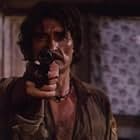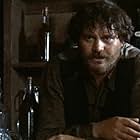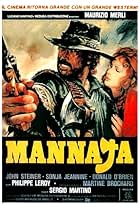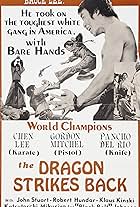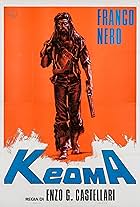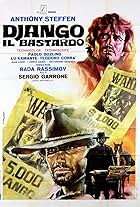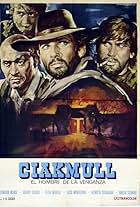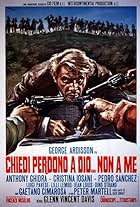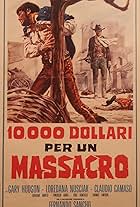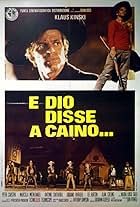IMDb RATING
5.9/10
170
YOUR RATING
A young deputy tries to sober and revitalize a washed up, alcoholic sheriff to take down a pair of warring gangs of criminals in the Old West.A young deputy tries to sober and revitalize a washed up, alcoholic sheriff to take down a pair of warring gangs of criminals in the Old West.A young deputy tries to sober and revitalize a washed up, alcoholic sheriff to take down a pair of warring gangs of criminals in the Old West.
Photos
Dragomir Bojanic-Gidra
- Sheriff 'Tequila' Joe Donnell
- (as Antonio Ghidra)
Mimmo Palmara
- Manuel Trianas
- (as Dick Palmer)
Felicita Fanny
- Consuela
- (as Felicita Fanni)
Mimo Billi
- Rodriguez
- (as Mimmo Billi)
Claudio Ruffini
- Mulligan Henchman
- (as Claude Ruffin)
Raul Lovecchio
- Trianas Henchman
- (as Raoul Amari)
Storyline
Did you know
- TriviaItalian censorship visa # 51278 delivered on 5-4-1968.
- ConnectionsEdited into Spaghetti Western Trailer Show (2007)
Featured review
Once you get down to brass tacks Enzo D'ellAquia's TEQUILA JOE is pretty much an Italiano budget line take on Howard Hawks' RIO BRAVO and more specifically EL DORADO, the 1967 film where the Duke and James Caan ride into town to help drunkard sheriff Robert Mitchum fend off Christopher George and his gang of hired guns as they try to drive chesty Michelle Carey and her family off their land.
Italian genre cinema favorite Fernando di Leo essentially pared the plot ideas for EL DORADO down to their bare minimum, compressing the Wayne, Caan, and Carey characters down into Jean Sobieski's Deputy Bert, young and inexperienced but fast on the draw and more idealistic than the man he's trying to help rehabilitate. Which would be (cheers for the correction!) Serbian actor Anthony Gidra's "Tequila Joe", a small town sheriff who has given himself up to drink and neglect after a personal tragedy.
Things come to a head when it's revealed that the town bosses had a hand in that tragedy, and that Sobieski's character has a very personal stake in seeing them brought to justice that only becomes clear during the final showdown as the two lawmen take on the bad guys in a sprawling, bloody gunfight. Unless of course you've seen more than five of these things and figure it out the minute you see the two standing side by side. Took me about half the first reel.
Sobieski is somewhat wooden as the novice but highly skilled younger gunfighter, bearing more than a passing resemblance to John Phillip Law that can hardly be an accident. The real show is Gidra's conflicted and self tortured drunken sheriff. He may not have had the range as an actor that came so natural to Robert Mitchum but he is fabulous as the forlorn, grizzled, regret-filled veteran who completely resents the younger man's efforts to help him.
Gidra's face has a kind of quiet hurt to it that is well served by the role: His characters are almost always thoughtful and melancholy, and he shines in some of the scenes of introspection where Joe is forced to concede that he really is washed up & unable to cope with the threat even if he wanted to. It's also interesting to see the reverse of the Lee Van Cleef effect of an older veteran taking a younger gunslinger under his wing to show him the ropes. Rather it's the younger guy who has to show the bewildered older lawman why he should care by putting them both in a situation where they have everything to lose, since all they have left in the world is each other.
It's also a far less boisterous film than either of the Howard Hawks movies, with the bulk of the movie set indoors with people talking to each other. Like most Anthony Gidra spaghettis the tone of the film is rather dry if not downright serious with a lack of the paste-in comic relief roles usually found in an Italian made western. Gidra's agent must have had a contract claus forbidding comedy. The movie is still stylishly photographed with that Holodeck look of un-reality that makes 1968 such an interesting year for spaghetti westerns; everybody looks like they are wearing a costume except for Gidra, who looks like he just rolled out of his cot. Fans will be delighted.
7/10.
Italian genre cinema favorite Fernando di Leo essentially pared the plot ideas for EL DORADO down to their bare minimum, compressing the Wayne, Caan, and Carey characters down into Jean Sobieski's Deputy Bert, young and inexperienced but fast on the draw and more idealistic than the man he's trying to help rehabilitate. Which would be (cheers for the correction!) Serbian actor Anthony Gidra's "Tequila Joe", a small town sheriff who has given himself up to drink and neglect after a personal tragedy.
Things come to a head when it's revealed that the town bosses had a hand in that tragedy, and that Sobieski's character has a very personal stake in seeing them brought to justice that only becomes clear during the final showdown as the two lawmen take on the bad guys in a sprawling, bloody gunfight. Unless of course you've seen more than five of these things and figure it out the minute you see the two standing side by side. Took me about half the first reel.
Sobieski is somewhat wooden as the novice but highly skilled younger gunfighter, bearing more than a passing resemblance to John Phillip Law that can hardly be an accident. The real show is Gidra's conflicted and self tortured drunken sheriff. He may not have had the range as an actor that came so natural to Robert Mitchum but he is fabulous as the forlorn, grizzled, regret-filled veteran who completely resents the younger man's efforts to help him.
Gidra's face has a kind of quiet hurt to it that is well served by the role: His characters are almost always thoughtful and melancholy, and he shines in some of the scenes of introspection where Joe is forced to concede that he really is washed up & unable to cope with the threat even if he wanted to. It's also interesting to see the reverse of the Lee Van Cleef effect of an older veteran taking a younger gunslinger under his wing to show him the ropes. Rather it's the younger guy who has to show the bewildered older lawman why he should care by putting them both in a situation where they have everything to lose, since all they have left in the world is each other.
It's also a far less boisterous film than either of the Howard Hawks movies, with the bulk of the movie set indoors with people talking to each other. Like most Anthony Gidra spaghettis the tone of the film is rather dry if not downright serious with a lack of the paste-in comic relief roles usually found in an Italian made western. Gidra's agent must have had a contract claus forbidding comedy. The movie is still stylishly photographed with that Holodeck look of un-reality that makes 1968 such an interesting year for spaghetti westerns; everybody looks like they are wearing a costume except for Gidra, who looks like he just rolled out of his cot. Fans will be delighted.
7/10.
- Steve_Nyland
- May 3, 2009
- Permalink
Details
- Release date
- Country of origin
- Language
- Also known as
- And Then a Time for Killing
- Production companies
- See more company credits at IMDbPro
- Runtime1 hour 35 minutes
- Sound mix
- Aspect ratio
- 1.85 : 1
Contribute to this page
Suggest an edit or add missing content

Top Gap
By what name was Time and Place for Killing (1968) officially released in Canada in English?
Answer





